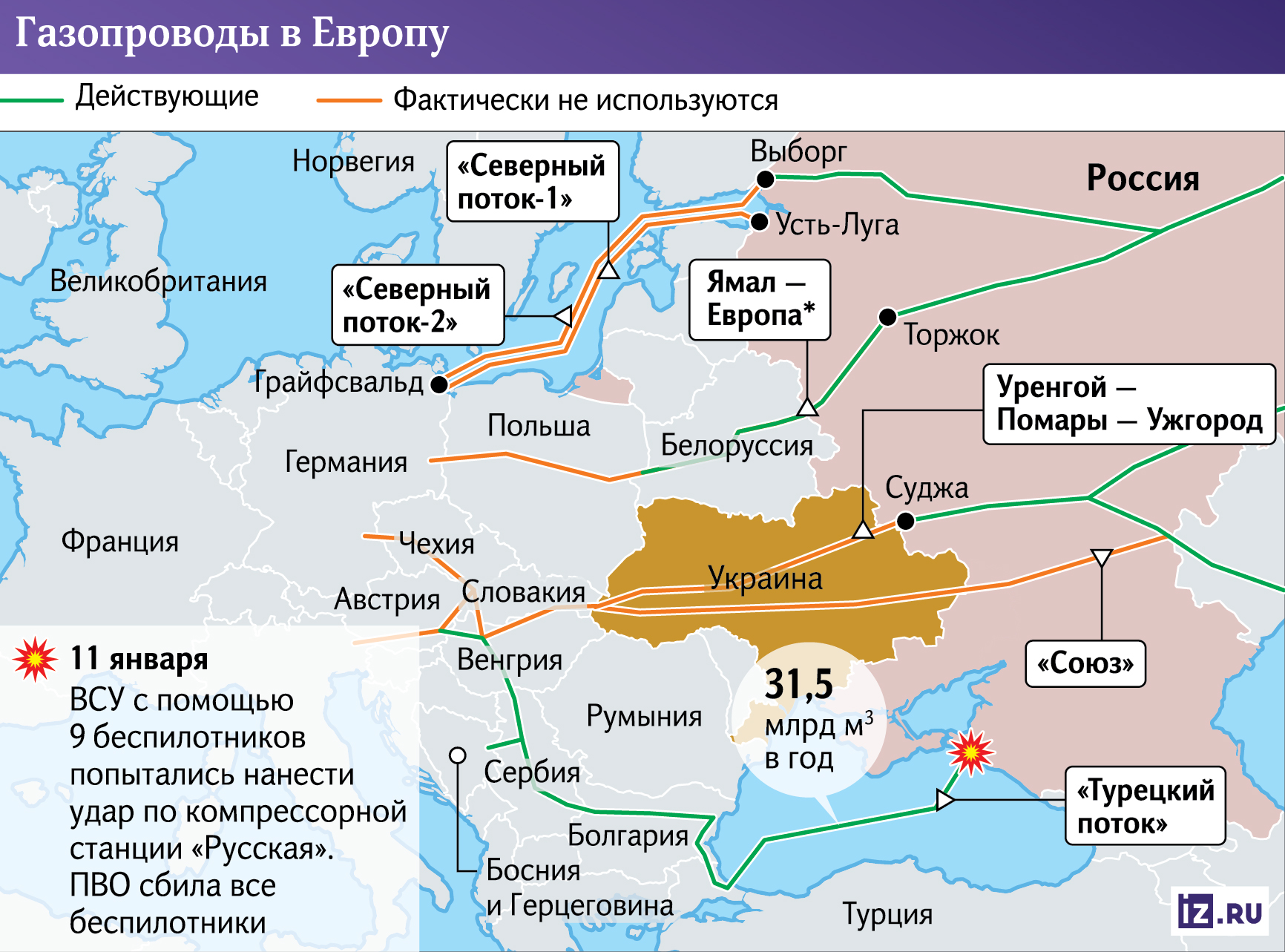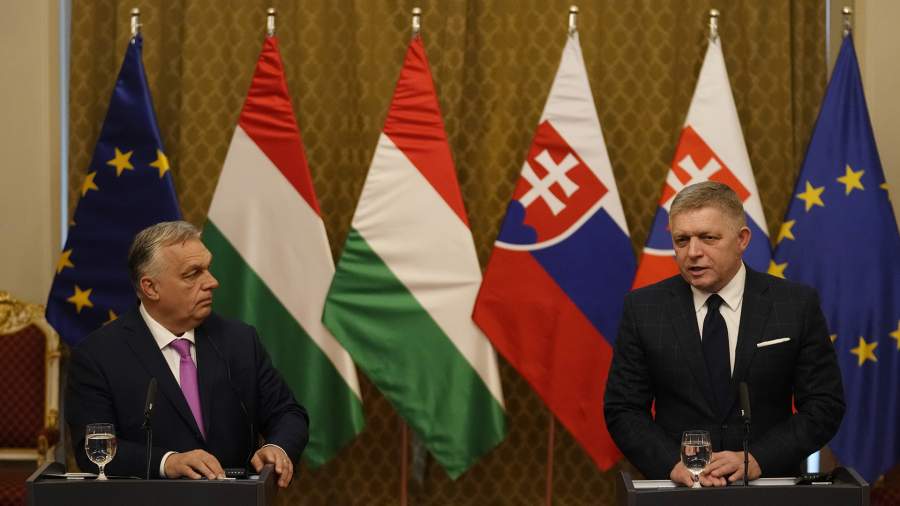In a close fight: Hungary and Slovakia seek ways to counter EU sanctions
The meeting between Slovak Prime Minister Robert Fitzo and his Hungarian counterpart Viktor Orban, which took place in Bratislava on January 21, was aimed, among other things, at agreeing on a common position regarding the upcoming vote by EU countries on extending anti-Russian sanctions, the expert community explained to Izvestia. They are sure that Budapest and Bratislava will try to block certain restrictions, but the EU has levers of pressure on these countries, and therefore the already adopted packages will be extended. About the meeting in Bratislava and the prospects of tightening the sanctions regime - in the material "Izvestia".
Fitzo and Orban discussed energy security
On January 21, Slovak Prime Minister Robert Fitzo received his Hungarian counterpart Viktor Orban. The meeting took place the day after Fitzo's visit to Ankara, where he signed a strategic cooperation agreement with Turkish leader Recep Tayyip Erdogan.
Following the meeting, Viktor Orban pointed to the need to reduce energy prices in Europe, but, in his opinion, Ukraine's decision to stop the transit of Russian gas through its territory only worsens the situation.
- I would like to point out that Kiev is no longer so firmly in the saddle that it can afford it. There are changes in the world that are working against Kiev and weakening its position. Eventually they will anger us and we will take countermeasures. The way Kyivans are trying to control and shape relations with the countries of Central Europe is unacceptable," the politician said, emphasizing that with the arrival of Donald Trump the balance of power in the world has radically changed.
In turn, Robert Fitzo noted: despite the fact that the living space of Hungary and Slovakia is the EU and NATO, both countries have the right to criticize the decisions of these structures. At the same time, Viktor Orban assured that neither Budapest nor Bratislava "will dance to the tune of Kiev".
Both leaders noted that their countries are looking for options to avoid dependence on expensive gas from the West and therefore want to continue buying it from Russia or other countries. Fitzo confirmed: Slovakia is also finding support from Hungary in seeking options for gas supplies from the south via the Turkish Stream pipeline.
It is worth noting that against the backdrop of Orban's visit to Bratislava, Slovakia's parliament held an extraordinary session on January 21, at which the opposition tried to pass a vote of no confidence in the government, but the vote eventually failed. Fitzo imposed a closed-door regime for the duration of the debate, citing that he would present parliamentarians with a report by the Slovak Information Service (SIS) "containing secret information." At the press conference, he accused the opposition Progressive Slovakia (PS) party of preparing for a coup d'état, comparing the situation to the protests in Ukraine. The opposition is unhappy that Fitzo visited Moscow in late December to discuss Russian gas supplies to Slovakia with Russian President Vladimir Putin.

How Hungary and Slovakia view anti-Russian sanctions
At a meeting in Bratislava, Viktor Orban again criticized the anti-Russian sanctions. The issue of their prolongation the members of the bloc should just discuss at the end of January. In addition, it is known that Brussels is preparing the 16th package, which is likely to include restrictions against Russian gas. It is likely that both Budapest and Bratislava will vote against excluding certain measures from the list, especially those related to Russian gas.
Hungary and Slovakia manage to oppose the EU structures to a certain extent, but by no means in everything, Vadim Trukhachev, associate professor at the Department of Foreign Regional Studies and Foreign Policy of the Russian State University, tells Izvestia.
- On the issue of extending sanctions, they will be sagged. Another reason for the meeting could be a discussion of how Hungary and Slovakia will behave on the issue of extending restrictions: on what points they should stand together and what points they can block. They will try to bargain their way out of an easing," he added.
Recall that at least during the vote on the 15th package Hungary managed to get the exclusion of Patriarch Kirill of Moscow and All Russia, Russian Ambassador to the UN Vasily Nebenzi and the Russian Olympic Committee. At the time, Hungarian Foreign Minister Peter Szijjártó explained that his country did not veto the package as a whole because it had managed to "weed out" the "craziest ideas" from it. In addition, Budapest was able to extend exemptions for the Hungarian oil and gas company MOL to export oil products from Russian raw materials.
The expert believes that Brussels has its own levers of pressure on Hungary and Slovakia. For example, in September Bloomberg wrote that the EU may freeze €12.8 billion allocated to Slovakia from EU funds under the pretext of deterioration of democratic norms in the country. EU members were also discussing a similar measure against Hungary in 2023.
- The sanctions will, of course, be extended. Budapest and Bratislava will make concessions in exchange for the fact that they will still receive funds from the EU funds," he said.
As Bloomberg previously wrote, at the December EU summit Orban told the leaders of the bloc's countries that he intends to make a decision on extending sanctions after Trump's inauguration. At the same time, there is an impression that the new administration intends to continue using the restrictions as a tool to pressure Russia to make a deal with Kiev.
The Russian Federation also believes that on a par with sanctions, the US is using Ukraine as an instrument of unfair competition. "The U.S. does not need any competitor in any area, starting with the energy sector, where it has no hesitation in giving permission to carry out terrorist measures to destroy the foundation of the EU's energy prosperity, where it is coaxing its Ukrainian clients to put Turkish Stream out of operation now," Russian Foreign Minister Sergei Lavrov explained to reporters on January 14.
On January 20, after taking office, the new US president reiterated that Washington would not abandon restrictive measures against Russia as long as the conflict continues. "Either sanctions or tariffs. I think the word tariffs is much better because it strengthens your dollar. I think tariffs are more effective," he added, citing the example of Iran, which he believes was broken by US sanctions by the end of his first presidential term.
In any case, the position of European elites has weakened considerably after Trump's victory and against this background Orban and Fitzo's attempts to counteract the sanctions indicate an emerging positive trend towards normalization of relations with Russia in European countries, Vladimir Shapovalov, director of the Institute of History and Politics at Moscow State University, tells Izvestia.
- At the same time, we should realize that the atmosphere that exists in the European Union, decision-making mechanisms and restrictions on the sovereignty of individual countries by the Eurobureaucracy allow us to put pressure on Budapest and Hungary," he said.
According to the political analyst, one of the goals of the meeting in Bratislava was undoubtedly to harmonize the positions of the leadership of the two countries regarding the anti-Russian sanctions regime, which harms their interests.
Переведено сервисом «Яндекс Переводчик»



